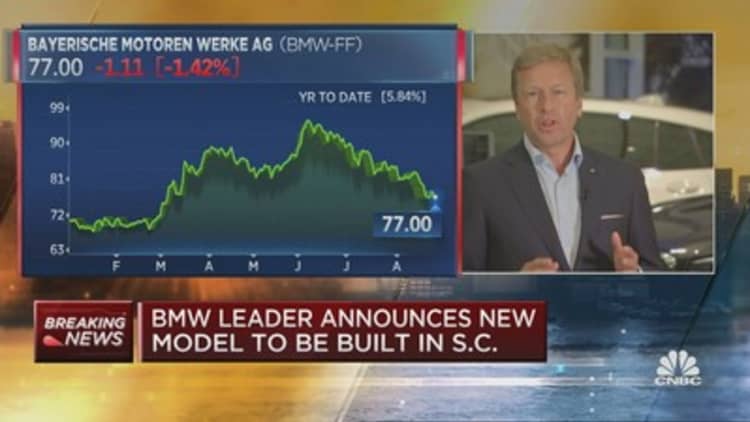[ad_1]
BMW Group plans to invest $1.7 billion in its U.S. operations to build electric vehicles and batteries, the company announced Wednesday.
The investment will include $1 billion to prepare for production of EVs at the automaker’s existing Spartanburg factory in South Carolina, and $700 million for a new high-voltage battery-assembly facility in nearby Woodruff.
The German automaker expects to produce at least six fully electric models in the U.S. by 2030. The Spartanburg facility, where the investment announcement took place, currently produces BMW “X” SUVs and lithium-ion battery modules for its two plug-in hybrid electric vehicles. Production of the new hybrid-electric BMW XM is expected to begin later this year.
“Going forward, it will also be a major driver for our electrification strategy, and we will produce at least six fully electric BMW X models here by 2030,” BMW Chair Oliver Zipse said in a release.
BMW on Wednesday also announced a deal to purchase battery cells from Japan-based Envision AESC, which will build a new battery cell factory in South Carolina to supply the BMW plants.
The Envision AESC facility is expected to have annual production capacity of 30 gigawatt hours — in line with plans of other automakers and battery suppliers for U.S. plants, BMW said.
A spokesperson for Envision AESC was not immediately available for comment. In April, the company announced plans to spend $2 billion to build a second U.S. plant in Kentucky. Its first plant in Tennessee supplies Nissan Motor.

BMW has already announced four additional battery cell factories will be built in Europe and China to meet its demand for next-generation battery cells.
The announcements are the latest of several recent multibillion-dollar investments in U.S production of EVs and batteries amid tightening emissions regulations and legislation to encourage domestic manufacturing.
Automakers are also facing stricter sourcing guidelines that are part of the Inflation Reduction Act and the United States-Mexico-Canada Agreement, formerly the North American Free Trade Agreement. Both policies increased requirements for domestically sourced vehicle parts and materials to avoid tariffs or qualify for financial incentives.
Source link



